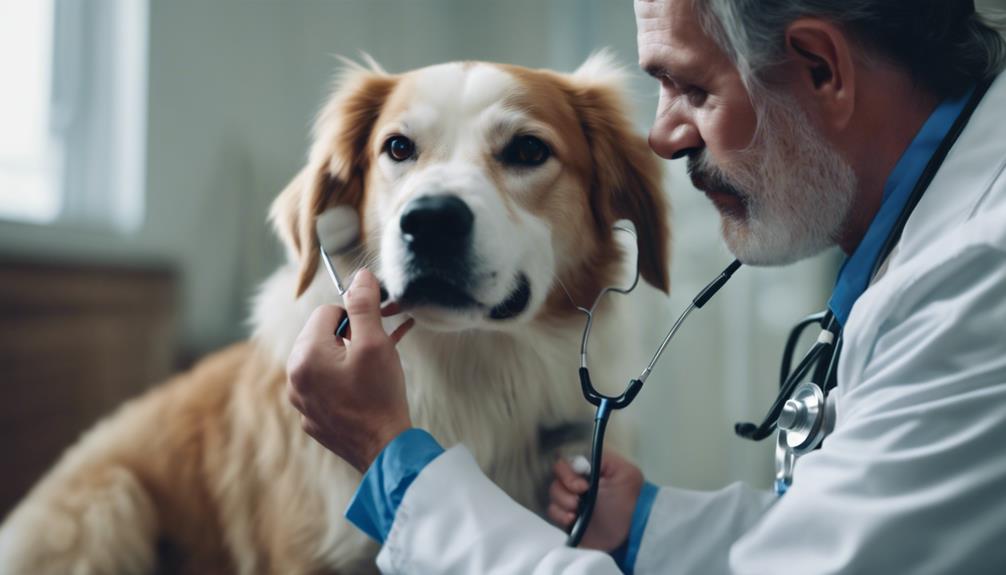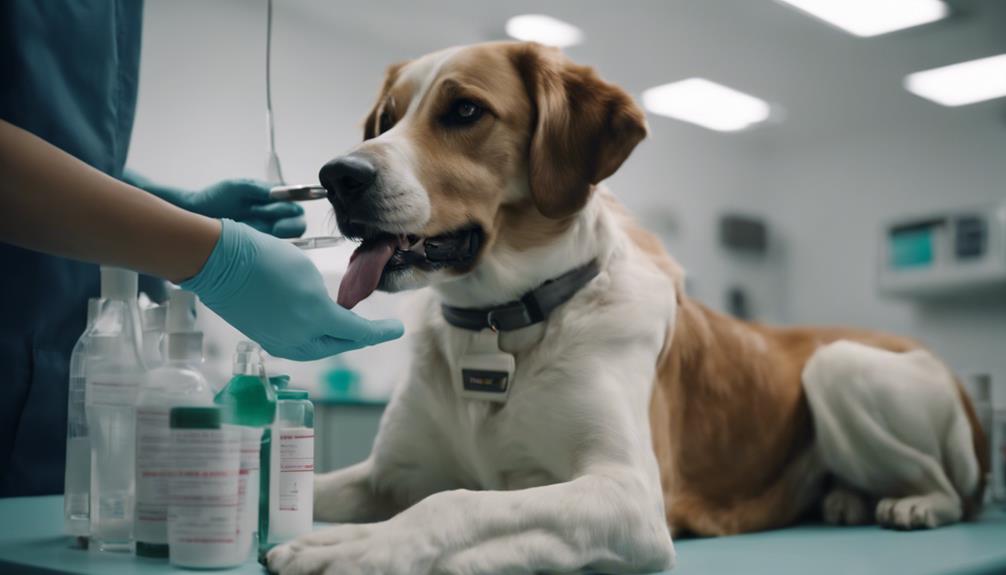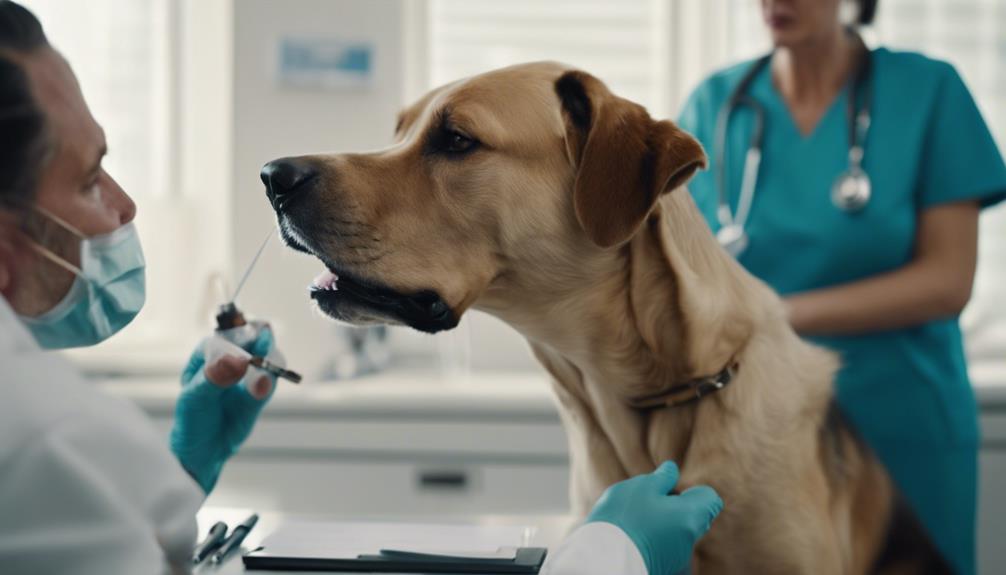Kennel cough, a prevalent concern among dog owners, is a multifaceted respiratory issue with various underlying causes. From viral and bacterial influences to environmental triggers, understanding the complexities of this condition is paramount.
The symptoms, while initially mild, can progress rapidly, especially in vulnerable canine populations. Prevention and treatment strategies play a crucial role in managing kennel cough effectively.
Stay tuned to explore the nuances of this common yet impactful canine health issue that warrants attention and proactive measures for the well-being of our furry companions.
Key Takeaways
- Kennel cough is often caused by a mix of bacterial and viral agents or environmental irritants.
- Symptoms include persistent dry cough, gagging, and cold-like signs; energy levels usually remain normal.
- Prevention involves isolating infected dogs, disinfecting surfaces, and avoiding crowded environments.
- Treatment ranges from observation to cough suppressants or antibiotics, tailored to each case's severity.
Kennel Cough Overview
Kennel cough, an umbrella term encompassing various respiratory issues that manifest as a persistent cough in dogs, is a common condition affecting canines worldwide. This condition can be caused by a combination of bacterial and viral agents, as well as non-infectious factors such as environmental irritants.
Bordetella, a contagious bacterium, is commonly associated with symptoms of kennel cough. Dogs with kennel cough may exhibit symptoms like coughing, gagging, and cold-like signs. It is essential for pet owners to be aware of these symptoms to seek appropriate care.
Understanding the nature of kennel cough can help in its prevention and management, ensuring the well-being of our furry companions.
Causes and Transmission
The transmission of kennel cough is commonly facilitated in environments with high population density among dogs. It spreads easily in places like dog parks or boarding facilities where multiple dogs interact closely. Factors such as stress and poor air quality can increase the susceptibility of dogs to kennel cough.
The infection can be transmitted through the air or by coming into contact with contaminated surfaces. To prevent the spread of kennel cough, it is essential to disinfect commonly touched areas and isolate infected dogs promptly. This proactive approach can help in containing the spread and protecting other dogs from contracting the illness.
- Fear of seeing your furry friend in discomfort
- Concern about the rapid spread of the infection
- Urgency to take preventive measures
- Anxiety over the potential severity of the illness
- Hope for a quick recovery and return to normalcy
Symptoms and Diagnosis

Upon observation of a dog displaying symptoms potentially indicative of kennel cough, a thorough evaluation by a veterinary professional is essential for accurate diagnosis and appropriate management. The symptoms of kennel cough can vary from a persistent dry cough, gagging, honking cough, sneezing, watery eyes, to a runny nose. Typically, energy levels and appetite remain normal despite the cough. Diagnosis is primarily based on these symptoms, but specific tests may be necessary in severe cases or for vulnerable dogs. Early detection, especially in puppies and older dogs, is crucial to prevent complications. Below is a table summarizing common symptoms observed in dogs with kennel cough:
| Symptom | Description |
|---|---|
| Persistent dry cough | Continuous coughing |
| Gagging | Sounds of choking or heaving |
| Honking cough | Cough that sounds like a honk |
| Sneezing | Repeated sneezing episodes |
| Watery eyes | Excessive tearing |
| Runny nose | Nasal discharge |
Prevention Strategies
To mitigate the risk of kennel cough transmission and safeguard canine health, implementing effective prevention strategies is paramount. These strategies not only protect individual dogs but also help in preventing the spread of the disease within communities. Here are some key prevention measures to consider:
- Vaccination: Ensure your dog is up to date on vaccinations, including the Bordetella vaccine.
- Hygiene: Maintain good hygiene practices by regularly cleaning and disinfecting common areas and surfaces.
- Ventilation: Provide adequate ventilation in enclosed spaces to reduce the concentration of airborne pathogens.
- Quarantine: Isolate sick dogs and those exposed to the illness to prevent further spread.
- Avoid Crowded Areas: Limit exposure to crowded places where the risk of transmission is higher.
Treatment Approaches

Implementing tailored treatment approaches is essential in effectively managing kennel cough in dogs. While kennel cough often resolves on its own, in persistent cases, treatment may involve the use of cough suppressants or antibiotics.
Cough suppressants can help alleviate the discomfort caused by the persistent cough, especially at night when it tends to worsen. Antibiotics may be prescribed in cases where a bacterial infection is present or suspected. It is crucial to monitor the dog's symptoms closely and adjust the treatment plan as needed.
Each case of kennel cough is unique, and a personalized approach to treatment can help speed up recovery and prevent potential complications.
Management and Isolation
Effective management of kennel cough involves proper isolation protocols to prevent the spread of the infection in communal settings. Isolation helps contain the disease and protects other dogs from contracting it.
When dealing with kennel cough, emotions can run high due to concerns for the well-being of our beloved pets. Here are some key emotional considerations to keep in mind:
- Fear of seeing our furry friends in discomfort.
- Anxiety about the potential spread of the infection.
- Frustration over the limitations on social interactions for our dogs.
- Relief when symptoms start to improve.
- Hope for a quick recovery and a return to normalcy.
Importance of Early Detection

Early detection of kennel cough plays a crucial role in ensuring prompt intervention and preventing potential complications in affected dogs. Identifying the initial symptoms such as a persistent dry cough, gagging, or sneezing can lead to timely treatment, reducing the severity and duration of the illness.
In puppies and older dogs, early detection is particularly important as they are more vulnerable to developing complications such as pneumonia. By recognizing kennel cough early on, pet owners and veterinarians can take necessary steps to limit the spread of the infection, provide appropriate care, and monitor the dog's condition closely.
Regular monitoring for any signs of respiratory distress or worsening symptoms is essential in managing kennel cough effectively.
Conclusion
In conclusion, kennel cough is a respiratory condition in dogs caused by a combination of viral and bacterial factors or environmental irritants.
It is commonly transmitted in densely populated areas like dog parks and boarding facilities.
Prompt diagnosis and preventative measures are crucial in managing and preventing the spread of this contagious ailment.
Effective treatment options, tailored to individual cases, can help alleviate symptoms and prevent complications in vulnerable groups like puppies and older dogs.




